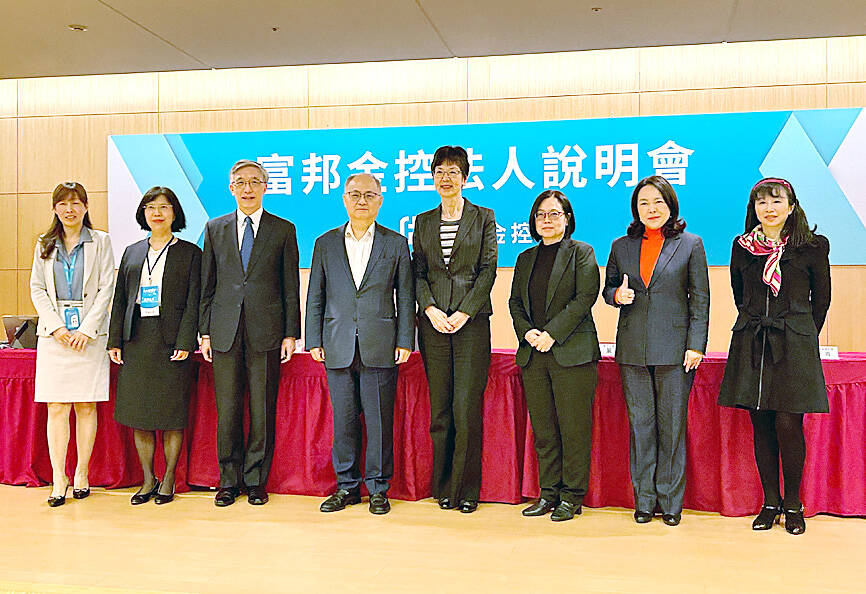Fubon Financial Holding Co (富邦金控) at an earnings conference yesterday said it is well-positioned to adopt the new IFRS 17 international accounting rules next year, thanks to its stable profitability and financial health.
The conglomerate’s flagship unit, Fubon Life Insurance Co (富邦人壽), would have no difficulty complying with the new system, the goals of which are to provide a more economic valuation of insurance assets and liabilities, increase comparability across companies and improve transparency, Fubon Financial said.
Notably, valuations of assets and liabilities would be based on the market, rather than historic or book value, the company said.

Photo: CNA
Fubon Life last year generated a record net income of NT$102.66 billion (US$3.11 billion) on the back of stock rallies in Taiwan and overseas, although bond holdings incurred losses of NT$444 million, it said.
The firm’s unrealized gains amounted to NT$90 billion in late December last year, but eased to NT$70 billion last month due to global stock routs, it added.
Fubon Financial president Jerry Harn (韓蔚廷) said the conglomerate would adopt a cautious strategy this year in dealing with market volatility.
“US President Donald Trump appears flexible, but [is] unpredictable over his trade policy,” Harn said. “It is better to raise cash positions and join the market when investment opportunities arise.”
Cash holdings rose NT$50.4 billion to NT$245.2 billion last year, company data showed.
Altogether, the insurance unit saw local shares generate NT$154.6 billion of profit last year, soaring 2.35 times from a year earlier and suggesting an annual return of 24.76 percent.
Fubon Financial reported a net profit of NT$150.82 billion last year, with earnings per share of NT$10.77.
Harn said the company would decide later on dividends, which would reflect last year’s earnings improvement and potential capital needs for future development.
In related news, O-Bank Co (王道商業銀行) yesterday said its office in Singapore would begin operations next quarter to tap into business opportunities in ASEAN markets.
The bank’s representative office in Sydney, Australia, is also seeking to upgrade into a banking branch, O-Bank president Elton Lee (李芳遠) said.
The bank reported a record profit of NT$3.89 billion last year, with earnings per share of NT$1. Its loan-to-deposit ratio grew from 68.37 percent in 2023 to 71.38 percent, while net interest income margin increased 5 basis points to 0.81 percent.
Loans to consumers and small enterprises underpinned profit growth, but bad loan ratios remained low at 0.12 percent, suggesting robust asset quality, and is favorable for the bank’s bid to become a boutique lender in Taiwan’s crowded banking market.

TARIFFS: The global ‘panic atmosphere remains strong,’ and foreign investors have continued to sell their holdings since the start of the year, the Ministry of Finance said The government yesterday authorized the activation of its NT$500 billion (US$15.15 billion) National Stabilization Fund (NSF) to prop up the local stock market after two days of sharp falls in reaction to US President Donald Trump’s new import tariffs. The Ministry of Finance said in a statement after the market close that the steering committee of the fund had been given the go-ahead to intervene in the market to bolster Taiwanese shares in a time of crisis. The fund has been authorized to use its assets “to carry out market stabilization tasks as appropriate to maintain the stability of Taiwan’s

STEEP DECLINE: Yesterday’s drop was the third-steepest in its history, the steepest being Monday’s drop in the wake of the tariff announcement on Wednesday last week Taiwanese stocks continued their heavy sell-off yesterday, as concerns over US tariffs and unwinding of leveraged bets weighed on the market. The benchmark TAIEX plunged 1,068.19 points, or 5.79 percent, to 17,391.76, notching the biggest drop among Asian peers as it hit a 15-month low. The decline came even after the government on late Tuesday authorized the NT$500 billion (US$15.2 billion) National Stabilization Fund (國安基金) to step in to buoy the market amid investors’ worries over tariffs imposed by US President Donald Trump. Yesterday’s decline was the third-steepest in its history, trailing only the declines of 2,065.87 points on Monday and

TARIFF CONCERNS: The chipmaker cited global uncertainty from US tariffs and a weakening economic outlook, but said its Singapore expansion remains on track Vanguard International Semiconductor Corp (世界先進), a foundry service provider specializing in producing power management and display driver chips, yesterday withdrew its full-year revenue projection of moderate growth for this year, as escalating US tariff tensions raised uncertainty and concern about a potential economic recession. The Hsinchu-based chipmaker in February said revenues this year would grow mildly from last year based on improving supply chain inventory levels and market demand. At the time, it also anticipated gradual quarter revenue growth. However, the US’ sweeping tariff policy has upended the industry’s supply chains and weakened economic prospects for the world economy, it said. “Now

Six years ago, LVMH’s billionaire CEO Bernard Arnault and US President Donald Trump cut the blue ribbon on a factory in rural Texas that would make designer handbags for Louis Vuitton, one of the world’s best-known luxury brands. However, since the high-profile opening, the factory has faced a host of problems limiting production, 11 former Louis Vuitton employees said. The site has consistently ranked among the worst-performing for Louis Vuitton globally, “significantly” underperforming other facilities, said three former Louis Vuitton workers and a senior industry source, who cited internal rankings shared with staff. The plant’s problems — which have not